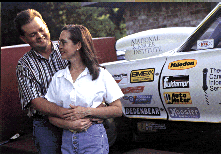Terri Rickerson: "They Were with Me Every Step of the Way"
 Terri Rickerson and her husband, Curt, have each other and a lot to be
thankful for.
Terri Rickerson and her husband, Curt, have each other and a lot to be
thankful for. Terri Rickerson: "They Were with Me Every Step of the Way"
 Terri Rickerson and her husband, Curt, have each other and a lot to be
thankful for.
Terri Rickerson and her husband, Curt, have each other and a lot to be
thankful for. Return to
Fall 97